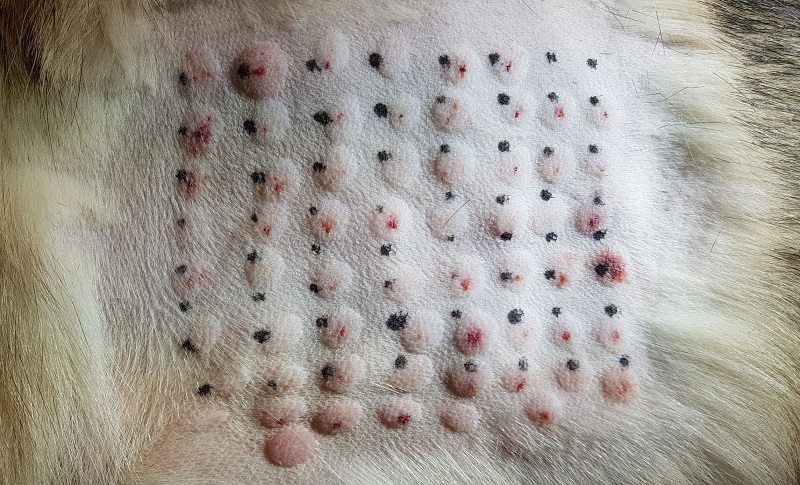Omega-3 fatty oils, especially EPA and DHA have a significant role in improving joint health of dogs and cats. What they do:
Anti-inflammatory properties
Reduce inflammation:
Function: The omega-3 fat is a powerful anti-inflammatory effect. They block the production of the proinflammatory cytokines as well as eicosanoids, which cause inflammation.
Omega-3s help reduce joint inflammation and relieve pain and swelling due to conditions like arthritis. Pets can move more easily, improving their overall quality of live.
Joint Lubrication and Health
Better joint lubrication
Function The omega-3 fatty acid helps maintain the health synovial, the fluid which lubricates our joints.
Benefits: A better lubrication results in smoother movement of the joints, and less friction. It will also decrease wear and tear to the cartilage. This is advantageous for pets suffering from joint issues or at risk of developing joint problems.
Cartilage Protection and Repair
Cartilage Protection:
Function: Omega-3s reduce the activity of enzymes that breakdown cartilage.
Benefits: Preventing cartilage destruction helps preserve joint integrity and slow the progression of joint-related diseases such as osteoarthritis.
Immune System Support
Immune System Regulation:
Function: Omega-3 acids control immune responses, promoting the balance of inflammation.
Benefits: A well-controlled immune system can manage joint issues, while avoiding excessive inflammation and further joint damage.
Mobility that is comfortable and improved
Improved Mobility
Omega-3s ease inflammation and protect joints to allow pets to move more easily.
Benefits Numerous pets, especially elderly animals or those suffering from arthritis experience reduced pain and increased mobility. This results in a happier and more active life.
Additional Health Benefits
Overall Health:
Function: Omega-3 fatty acids help the skin, cardiovascular or coat health of dogs and contribute to their overall wellbeing.
Benefits: A pet with a healthier body is likely to be more active and maintain better joint health over time.
Considerations and Usage
Dosage and Administration: The correct dosage of Omega-3s depends on the size of the pet and weight as well as specific health issues. The veterinarian's recommendation or product label instructions are important.
Omega-3s source: Supplements containing quality, high-quality fish oil are a common source of EPA & DHA. To ensure the safety and effectiveness of your pet, it is important to use supplements that are specifically designed for pet use.
Effects on the body: Omega-3 supplements are generally safe however, some pets might have digestive issues or have fishy breath. Start with a lower dosage and gradually increasing it to minimize negative side negative effects.
Conclusion
Omega-3 fatty oils are beneficial for the health of joints for both dogs and cats. Their ability to protect cartilage and enhance joint lubrication as well their anti-inflammatory properties aid in better joint function. Regular supplements lead to improved mobility and a more active, healthy lifestyle for your pet. Read the top rated dog herbalist for blog examples including pet anxiety supplements, herbal medicines for dogs and cats, pet supplements for pets with joint stiffness, pet supplements for show dogs and cats, pet meat protein supplements, pet aloe vera supplements, pet supplements for pets with nerve damage, pet supplements for senior pets and more.

Coconut Oil Helps With Allergies In Dogs And Cats.
Coconut oil has moisturizing, antimicrobial and therapeutic properties. It is a great option to treat skin allergies. Here are some ways coconut oil can benefit pets suffering from skin allergy:
Moisturizing Properties
Hydration of the Skin
Coconut oil has a moisturizing effect on the skin.
Benefits: Helps moisturise dry skin, which is flaky and itchy. It reduces itching while helping to maintain a healthy skin barrier. This is especially beneficial for pets with allergic skin conditions like dermatitis.
Anti-inflammatory effects
Reduce Inflammation
Function: Coconut oil contains lauric acid, a chemical that has anti-inflammatory properties.
Coconut oil can reduce swelling, inflammation and discomfort caused by skin allergies. This can offer significant relief for pets who suffer from allergic reactions.
Antimicrobial Activities
Combating Infections:
The function: Coconut oil contains antimicrobial properties like lauric and caprylic acids, which help to combat bacteria as well as viruses, fungi and other microorganisms.
Coconut oil is a natural remedy for secondary skin conditions caused by allergies, itchiness and irritation. This is beneficial in improving overall skin health and preventing complications.
Healing and Soothing
Help to Promote Healing
Coconut oil can be used to treat the skin.
Benefits: It soothes and heals small cuts, abrasions, or hot spots that can be result of excessive scratching. This can speed up the healing process for the skin damaged by allergies.
Barrier Protection
Enhancing Skin Barrier:
Coconut oil strengthens the natural barrier to the skin.
Benefits: A stronger skin barrier will protect against allergens as well as environmental irritants. It will also reduce the chances of allergic reactions and skin infections.
Dietary Supplements
Internal Benefits
Coconut oil can be consumed orally as a supplement to the diet.
Consumed, it improves overall general health of the skin. The anti-inflammatory, antimicrobial and immune-boosting properties could assist in reducing the severity of irritation and enhance your pet's immune system. This could potentially lower the risk of developing allergies.
Use and considerations
Topical Application Coconut oil can be applied directly to the part of the skin. Massage the coconut oil gently until it absorbs. You can do this once or twice a day depending on how serious the skin condition is.
Oral supplementation: Coconut oil can be added to the pet's food. A typical dose is one teaspoon for every ten pounds of weight. It is best to begin slowly and then increase the dose to avoid stomach upset.
Coconut Oil Quality - Use organic coconut oils made from virgin coconut that are devoid of preservatives or additives.
Monitoring for Reactions. Coconut oil is generally considered to be pet safe, make aware of any reactions.
Conclusion
Coconut oil can provide a natural treatment for allergies to the skin that can affect pets and humans. Its moisturizing anti-inflammatory and antimicrobial healing properties soothe and protect the skin. They can reduce inflammation and itching. Regular application of coconut oil on pets' skin can help reduce their allergy symptoms. Read the recommended petz park info for website recommendations including pet skin and coat supplements, pet supplements for pets with diabetes, pet supplements for breeding dogs and cats, pet supplements for pets with fear of sirens and horns, pet supplements for pets with dull coat, pet bilberry supplements, pet supplements for active pets, pet whey protein supplements and more.

Probiotics Are Beneficial For Dogs And Cats Who Suffer From Yeast Infections.
Probiotics can be beneficial in the treatment of yeast infections on dogs and cats. They work by promoting the balance of microorganisms both in the intestines and on the skin. Probiotics can treat yeast infections.
The restoration of the balance between microbial and physical
Balancing Gut Flora:
Function Probiotics are beneficial bacteria that keep a balanced balance of microorganisms within the digestive tract.
Benefits: An optimal gut microbiome improves overall immune system and assists in preventing yeast infection (such Candida). This helps manage yeast infections throughout your body.
Competition with pathogens
Competition with harmful microorganisms
Function Probiotics compete for space and resources with pathogenic microorganisms (causing illness) which includes yeast.
Benefits In terms of outdoing and out-competing yeast and other pathogens probiotics help reduce their ability to cause infection and help keep a healthy microbial ecosystem.
Modulation of Immune Response
Enhancing Immune Function
Function: Probiotics help to regulate the immune system by increasing the production of substances that affect the immune system.
Benefits: A more robust immune response can help the body to fight off yeast infections, and decrease the frequency of them.
Production of antimicrobial substances
Antimicrobial Factors are produced by:
Function: Some strains of probiotics create substances (such as bacteriocins) which have antimicrobial properties against yeast and other pathogens.
Benefits: These antimicrobial elements can help directly inhibit the yeast's growth, contributing to the control of yeast-related infections.
Reduce inflammation
Anti-inflammatory Effects:
Function The evidence suggests that probiotics reduce inflammation, that could be related to yeast infections.
Benefits: Probiotics can reduce inflammation and ease symptoms such as itchiness, redness, and discomfort that are result of yeast infection.
Help for Skin Health
Maintaining Skin Barrier Function:
Benefit: Probiotics are vital to ensure the integrity of the skin barrier.
A well-functioning skin barrier will lower the risk of yeast infections. This is because it stops yeast and other pathogens entering and causing an infection.
Utilization and Recommendations
Probiotics are of different types: Select probiotic supplements that include strains known to benefit skin health and combat yeast infections, like Lactobacillus and Bifidobacterium species.
Probiotics can be taken in a variety of forms. These are capsules (including powders) and chews (such as gum) as well as chews. Topical formulations of probiotics may be helpful for localized skin conditions.
Probiotics for long-term treatment could be necessary to maintain the balance of microorganisms and stop the recurrence of yeast infections.
Consultation with a Veterinarian Always consult a veterinarian when starting probiotic supplementation. They will be able to advise you on the best probiotic strains to use and also the dosage and duration, depending on your pet's health requirements.
Conclusion
Probiotics can be a valuable adjunct therapy for managing yeast infections in cats and dogs. Probiotics can help improve the appearance of skin by boosting immunity, improving the balance of microbes and reducing swelling. They also reduce the frequency and severity for yeast infections. Probiotics, when utilized in conjunction with a comprehensive treatment program, will improve the health and comfort of pets who suffer from yeast conditions. Check out the top yeast infections in dogs info for more advice including pet calming supplements, kidney disease in cats, pet supplements for pets with seizures, pet supplements for pets with skin infections, pet supplements for pets with fear of mirrors, pet milk supplements, pet meat protein supplements, pet egg protein supplements and more.
